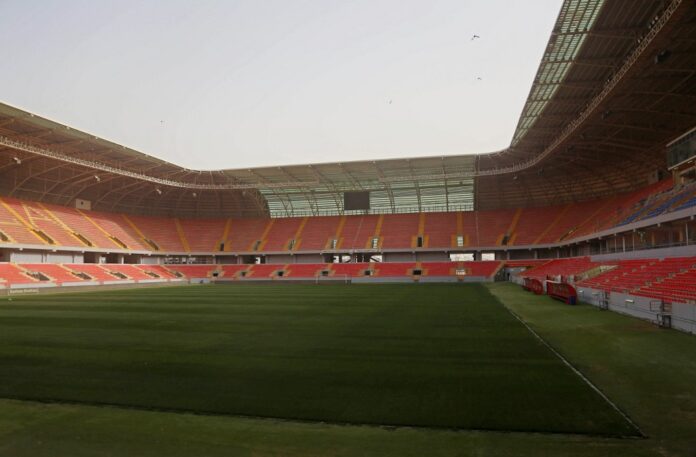Enough is enough.
That is the message coming loud and clear from Iraqi fans, players and anyone associated with the game in the country after FIFA intervened at the 11th hour to again deny the Lions of Mesopotamia a long-awaited Baghdad homecoming.
Last month FIFA and AFC announced the 21-year hiatus would end with Baghdad approved to host this week’s qualifier against the UAE as Iraq seek an unlikely third place finish in Group A of the Asian Qualifiers, to set up a playoff with the third-placed team from Group B, likely to be Australia.
But just a week out from the fixture, the international body had a change of heart — citing “broader shifts in global security” — relocating the fixture to neutral Saudi Arabia, with Riyadh’s iconic King Fahd International Stadium selected as the “home” venue for yet another Iraqi home game away from home.
“Football is played all over the country with no issues whatsoever,” striker Ahmed Yasin posted on social media. “This ban makes no sense. How much longer do we have to wait?”
His remarks were supported by many of his teammates, including returning striker Justin Meram and young gun Ali Al-Hamadi.
“The people of Iraq deserve better,” American-born Meram wrote. “We have been waiting years for the chance to play qualifiers on our home soil in front of our own country.”
Al-Hamadi added: “Once again, FIFA lets down 40 million of our people. Continuously punishing a country, but giving leeway to others in similar situations.”
Of course, Iraq did return home this week, defeating Zambia 3-1 in a friendly at the impressive Al-Madina Stadium in front of more than 25,000 fans in a match that went off without incident. But while friendly matches are one thing, what Iraqis crave most of all is a return of competitive matches to their home.
“Since the 2003 war, Iraq has played only four matches in Baghdad — all friendlies,” Iraqi journalist Hassanin Mubarak told Arab News before the news of FIFA’s U-turn was made public.
“This time it feels different. While the political situation in Iraq is far from perfect by any means, there is some optimism in the air that something is on the horizon, and it can be the start of something. This lifting of the ban on playing competitive matches in Baghdad is a long time coming.”
He added: “It is safe to play football in the Iraqi capital and has been for some time. With the opening of the Al-Madina Stadium and the Al-Zawraa Stadium, it represents change and the prospect of something brighter.
“It could be the start of something better for football in Iraq, and the lifting of the ban on the Iraqi capital demonstrates that Iraq is safe.”
Of course the ban wasn’t lifted and the interminable wait continues.
Not since Sept. 28 2001 has Iraq played a competitive fixture in the capital, a 1-0 win over Bahrain during qualifying for the 2002 FIFA World Cup.
When FIFA initially announced their removal of the ban last month there was much celebration from everyone associated with Iraqi football that the two-decade long ban on football in the capital was finally about to end, and Iraq could finally return home.
Because, while Iraq can play a home game anywhere, as it has been forced to do — playing games in the likes of Iran, Jordan, Qatar and even Malaysia — a home is more than just bricks and mortar.
It is a feeling of comfort. Of love. Of belonging. Having a house, or in Iraq’s case a stadium, is one thing, having a home is another. That feeling of a home is priceless.
Iraq’s national football team, however, have for the better part of the past two decades been a team without a home. Capital city Baghdad, and everything it represents, is home, but since September 2001, the Lions of Mesopotamia have been locked out.
“Playing at home is not just playing football,” veteran striker Alaa Abdul-Zahra said.
“It represents the return of hope and spirit to our country, but you stood against us as you stand (against us) every time.”
So frustrated are Iraqi fans and officials with FIFA’s backflip, a worldwide social media campaign to bring competitive international #FootballInBaghdad has sprung up, imploring FIFA to revisit their decision.
“To think the last World Cup qualifier to be played in Baghdad was in September 2001, Iraq was a different place, as was the world,” Mubarak said.
“Since then the sanctions have remained, and along with it the view from the world of Iraq and Baghdad that is unsafe. Maybe the rest of the world will look at Iraq differently, (it’s) something to at least be hopeful about.”
With the end of another World Cup qualifying campaign this week, Iraq’s wait for a return of competitive international football goes on. And with each passing friendly held without incident, FIFA’s decision to keep Iraq locked out of their home looks more and more cruel.
Enough is enough.

